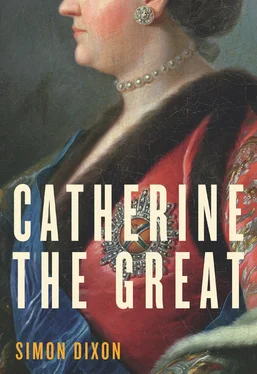The Search for Emotional Stability
1776–1784
After her accession to the throne, Catherine spent all too little time at Oranienbaum. But had she ever gazed up from the bed in the Damask Room, she would have seen on the ceiling a painting that perfectly encapsulated the tutelary relationship she strove to establish with each of her favourites. Urania teaching a youth , by the Venetian artist Domenico Maggiotto, portrayed a bare-breasted goddess looking down at a virile young man who returns her gaze in simple trust. 1Leonine, earnest and not very bright, Grigory Orlov had fitted the mould to perfection. ‘The apprehension of the Empress is extremely quick,’ Lord Cathcart observed in 1770, ‘that of Mr. Orloff rather slow, but very capable of judging well upon a single proposition, though not of combining many different ideas.’ 2Horace Walpole was typically franker: ‘Orlow talks an infinite deal of nonsense,’ he remarked during Grigory’s visit to London in 1775, ‘but parts are not necessary to a royal favourite or to an assassin.’ 3
Potëmkin, by contrast, demanded to be treated not as a pupil, but as an equal, and it made for heated arguments between them in the spring of 1776. ‘Sometimes,’ Catherine complained, ‘to listen to you speak one might think that I was a monster with every possible fault, and especially that of being beastly.’ It upset her that he resented her other friends, and flounced off in a temper when she refused to listen: ‘We quarrel about power, not about love. That’s the truth of it.’ 4Potëmkin, however, had reason to be unnerved. As a sign of Catherine’s wavering affections, Rumyantsev’s protégé Peter Zavadovsky, who had worked with her on the Provincial Reform, had been promoted Adjutant General on 2 January. This was the favourite’s office, still indelibly associated with Grigory Orlov. Later that month, Orlov himself unexpectedly returned to Russia, where he promptly fell sick, creating a complicated love triangle in which only Catherine herself can have felt fully at ease. A British diplomat reported that ‘two visits, which the Empress made to the Prince during his illness, caused a very warm altercation between her and the favourite’. Amidst rumours that he had poisoned Orlov, Potëmkin’s downfall was widely predicted, although some acknowledged that this arose ‘rather from its being universally wished, than from any actual symptoms’. 5Meanwhile, Catherine firmly resisted his attempts to persuade her to remove Zavadovsky. Quite apart from the ‘injustice and persecution’ the dismissal would inflict on ‘an innocent man’, there was her own reputation to consider: ‘If I fulfil this request, my glory will suffer in every possible way.’ 6Instead, her affair with Zavadovsky was publicly confirmed when he was promoted major general and granted 20,000 roubles and 1000 serfs on 28 June, the fourteenth anniversary of the empress’s accession. In an attempt to appease Potëmkin, she appealed to his vanity by presenting him with the Anichkov Palace and 100,000 roubles to decorate it as he pleased. Most of all, however, she appealed to his conscience, reassuring him that even as her passion had cooled, her friendship remained unquestioned: ‘I dare say that there is no more faithful friend than me. But what is friendship? Mutual trust, I have always thought. For my part, it is total.’ 7There is no reason to think this insincere, but she had meant it just as much when she insisted in an earlier note that ‘the first sign of loyalty is obedience’. 8True equality remained beyond reach in any relationship with an absolute monarch.
Such rapid changes of scene in the empress’s bedchamber prompted persistent rumours in the autumn of 1776 that she had taken yet another lover. Rumyantsev’s name was mentioned. ‘The leading actor of the German comedy is also spoken of,’ noted the venomous French chargé, the chevalier de Corberon: ‘It wouldn’t be surprising, but I doubt it.’ 9In the event, Zavadovsky was to remain in place until May 1777, a month before Orlov finally married his teenage cousin, Elizabeth Zinovyev. While Catherine bombarded ‘Petrushinka’ with passionate billets-doux, the stolid Ukrainian struggled to keep up his working relationship with her, sulking that she had so little time to spend on him. Increasingly conscious that Icarus was an impossible part to play, Zavadovsky discovered that politics was a topic best avoided: ‘If you had thought as much about despotism as I have,’ Catherine warned him, ‘you would not mention it much.’ Soon she was urging him to exchange his insecurity for trust and playfulness: ‘all this feeds love, which without amusement is dead, like faith without kind deeds’. 10In the end, it was he who tearfully begged the empress to release him from his misery. As Catherine told Potëmkin, ‘the whole conversation lasted less than five minutes’. 11Zavadovsky would soon return to a long career at Court, forgiven and befriended like all her former lovers. For the moment, however, he retired smarting to his Ukrainian estate at Lyalichi (later rechristened Ekaterinindar—‘Catherine’s Gift’). 12‘Amid hope, amid passion full of feelings, my fortunate lot has been broken, like the wind, like a dream which one cannot halt; [her] love for me has vanished.’ 13
No sooner had Zavadovsky faded from the scene than a more colourful lover emerged to take his place. This was Potëmkin’s Serbian-born adjutant, Semën Zorich, a swarthy hussar sixteen years younger than Catherine. ‘What a funny creature you have introduced to me!’ 14Having been imprisoned by the Turks after distinguishing himself in action, Zorich seemed less likely than Zavadovsky to suffer from hypochondria. Yet it was no easier for him to cope with the mercurial presence of his patron, who remained the guiding influence in the empress’s life. 15In May 1778, when Potëmkin humiliated him by presenting a handsome young officer to Catherine on her way to the theatre at Tsarskoye Selo, Zorich could no longer control himself. ‘As soon as Her Imperial Majesty was gone, he fell upon Potemkin in a very violent manner, made use of the strongest expressions of abuse, and insisted on his fighting him.’ Irritated by such a ‘fuss about nothing’, Catherine forced the rivals to shake hands over dinner in St Petersburg, but it was only a temporary rapprochement. ‘Potemkin is determined to have him dismissed,’ reported the recently arrived British ambassador, James Harris, ‘and Zoritz is determined to cut the throat of his successor. Judge of the tenour of the whole Court from this anecdote.’ 16
Insensitive to the anguish the empress suffered in her search for a stable, loving relationship—she blamed her recurrent headaches on her recent bout of ‘legislomania’—Harris regarded the ‘scene of dissipation and inattention’ presented by the Court of St Petersburg as the inevitable consequence of unnatural female rule. ‘Age does not deaden the passions, they rather quicken with years: and on a closer approach I find report had magnified the eminent qualities, and diminished the foibles, of one of the greatest ladies in Europe.’ 17Two years later, after Catherine had exchanged the favours of Zorich’s unfaithful successor, Ivan Rimsky-Korsakov, for those of another strapping young guards officer, Alexander Lanskoy, Corberon came to much the same conclusion:
If this sovereign were led, as she could be, by a man of genius, the greatest and best things might be achieved: but this man is not to be found, and by deluding each of her favourites, doing away with them and renewing them one by one, this woman’s successive weaknesses become innumerable and their consequences appalling. With the greatest of visions and the best of intentions, Catherine is destroying her country through her morals, ruining it by her expenditure, and will end up being judged a weak and romantic woman. 18
Читать дальше












